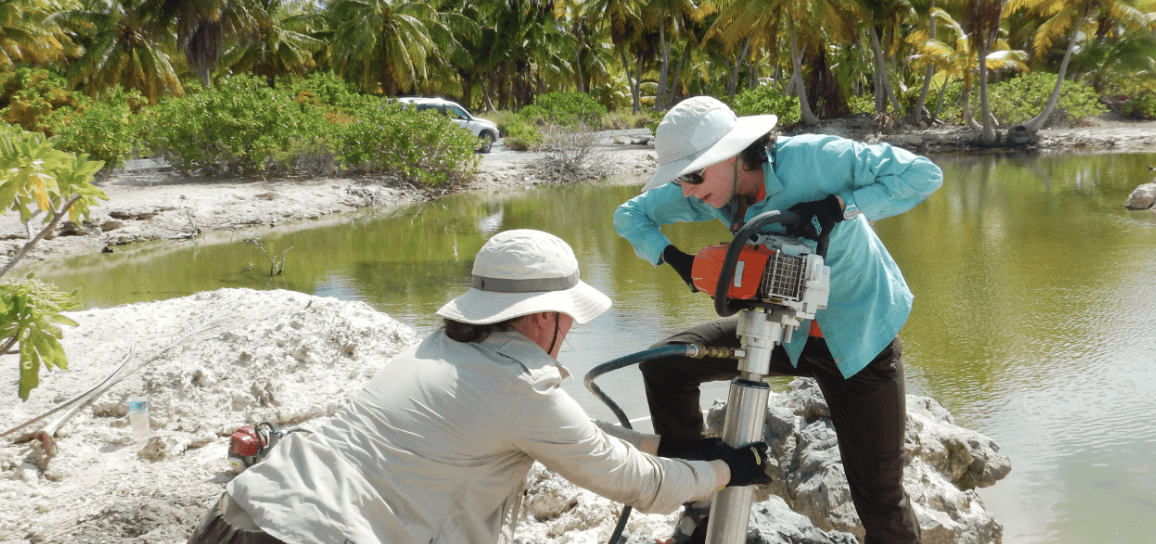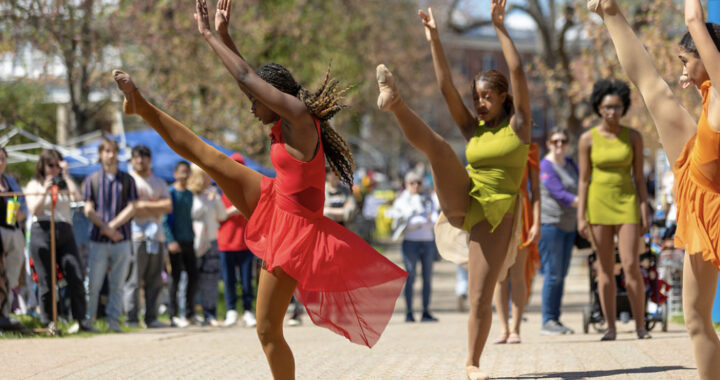Professor inspires undergraduate research for UMW student
4 min read
Andrea Moore
By SARAH GOODNOUGH
Senior Writer
Over Spring Break, UMW Assistant Professor Pamela Grothe and student researcher Andrea Moore flew to Christmas Island in the Republic of Kiribati to conduct paleoclimate research.
“We will be servicing our loggers on the reef…and collecting fossil coral samples to bring home,” said Dr. Grothe.
The researchers collected data regarding ocean salinity and temperature from the loggers and changed out the batteries to redeploy them. They also gathered numerous fossil coral samples. Once such sample was taken from a 5,000-year-old coral, measuring more than a meter in length. The samples will be used for paleoclimate reconstructions, which enable researchers to understand how past climatic events have affected the coral.
This trip was a collaboration with Georgia Tech and other marine biologists to monitor the reef, which recently underwent a bleaching event during the El Niño of 2015. It bleached and killed up to 90 percent of the coral reef at Christmas Island. Since then, researchers have been keeping track of the reef’s state.
“Most of the reef was dead, as was the last time,” said Dr. Grothe. “However, we are starting to see both new baby coral recruits as well as macro algae.”
The research conducted over Spring Break is a continuation of Dr. Grothe’s doctoral research, which involved the reconstruction of the El Niño-Southern Oscillation (ENSO) over the past several thousand years. ENSO is the variation of winds and sea surface temperatures over the eastern Pacific Ocean. It affects the climate of that region as well as causes damage to marine ecosystems, such as the coral reef at Christmas Island. By reconstructing these events, Dr. Grothe is able to examine past climate change to better understand how El Niño interacts with today’s climate.
“El Niño is a climate phenomenon in the tropical Pacific where the trade winds weaken, allowing the warm water piled up in the western Pacific to flow back towards the eastern Pacific,” said Dr. Grothe. “These events occur every 2-7 years and are the largest source for interannual climate variability across the planet, responsible for droughts and floods.”
 El Niño events can cause flooding and wildfires, which can add up to billions of dollars in damage, while also bleaching corals and shutting down South American fisheries. The question for the researchers is whether the El Niño events are part of the natural variation in climate or if they are aggravated by global warming.
El Niño events can cause flooding and wildfires, which can add up to billions of dollars in damage, while also bleaching corals and shutting down South American fisheries. The question for the researchers is whether the El Niño events are part of the natural variation in climate or if they are aggravated by global warming.
“My work aims to better understand if these events are happening more frequently and more strongly with global warming. This would be important to know for planning purposes and hazard mitigation,” said Dr. Grothe.
This research has become a point of interest for some UMW students, including senior environmental geology major Andrea Moore. Dr. Grothe has been to Christmas Island six times, but this is the first trip she has taken with a UMW student researcher. For Moore, it was her very first undergraduate research trip. In addition to accompanying Moore, Dr. Grothe was able to collect samples to be brought back to the university for students who are interested in this research.
For students who are unsure of whether or not they should pursue undergraduate research, Dr. Grothe has a few words of encouragement.
“Start early! Figure out what faculty are doing, approach them with your interests and ask how you can help. And then be dedicated. Research is a huge commitment so be prepared to spend a lot of time on it. It’s hands on learning experience that you just can’t get in the classroom,” said Dr. Grothe.
This is exactly what Moore did. Moore transferred to UMW in the fall of 2016, the same year Dr. Grothe came to the university as a visiting instructor.
“I took EESC 111 with her specifically because I was interested in her doctoral research,” said Moore. “I asked her if she was looking for any research assistants, and eventually – after signing on as an assistant professor – she took me on as her first student.”
The research trip provided Moore with the experience of what field work looks like outside of the classroom. Interim Dean of the College of Arts and Sciences, Dr. Keith Mellinger, described the other benefits that undergraduate research can provide for a student.
“Doing research teaches a new way of thinking that you rarely get in your regular courses,” said Dr. Mellinger. “It also encourages a degree of creativity for students as they pursue their projects, and it connects students in a much more meaningful way to their faculty. These connections lead to further opportunities – graduate school recommendations, internship opportunities, or further research collaborations.”
When transferring to UMW, Moore recognized the importance of undergraduate research for her academic and career plans.
“Graduate schools, internship programs, and employers all look for demonstrated effective written and oral communication skills and strong critical thinking ability, which are developed during the research process,” said Moore.
While Dr. Grothe hopes to continue her research on Christmas Island, her future research will also take her to the Chesapeake Bay.
“There is so much to learn about the paleoclimate here in Virginia that it makes sense to establish some roots locally,” said Dr. Grothe. “Plus, local research will be more affordable and attainable to more UMW students.”![]()











